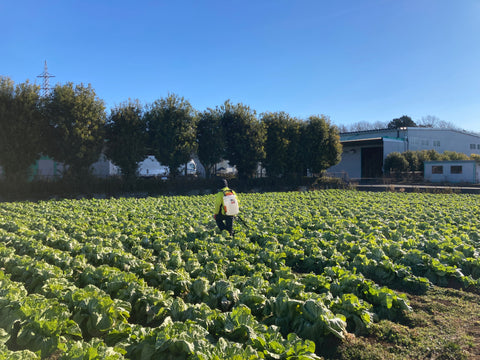I am Oyama, the CEO of KiliMOL.
On 5 January 2022, we visited a Chinese cabbage farm and a plant manufacturing TOKYO 8 using the natural circulation plant activator TOKYO 8. I would like to introduce you to TOKYO 8 because I believe it has great potential to contribute to the productivity improvement of organic agriculture.
TOKYO 8
Tokyo Bacteria Lab, operated by Taiyo Yuka Co., Ltd. (hereinafter referred to as “Taiyo Yuka ”), processes waste sludge using the power of bacteria. They verify various effects caused by the action of bacteria, and have succeeded in extracting and cultivating bacteria groups effective for the growth of crops and consequently developed an organic bacterial formulation. It was developed in Tokyo and named "TOKYO 8" because of its infinite potential. Rather than acting directly on crops to provide nutrients, activated bacteria acts on the soil, making it easier for crops to absorb nutrients from their roots. It is made from bacteria, but it is odorless, harmless, and easy to use. In Japan, they have already confirmed the effect on radishes, cabbages, carrots, green onions, onions, potatoes, chili peppers, and cherry tomatoes. They are currently applying for organic JAS registration. For more information, please visit the YouTube link below:
https://www.youtube.com/watch?v=AFTwjSFc_OU

Farm Tour
Mr. Matsumoto of Ascentia Holdings, Inc. (hereinafter “Ascentia ”) and Mr. Yohei Ishida, Ms. Haruko Suzuki, and Ms. Enola LaBeaune of Tokyo Bacteria Lab., who are members of Taiyo Yuka, visited a Chinese cabbage farm managed by Taiyo Yuka in Fujimino, Saitama Prefecture. From Fujimino, as the name suggests, you can clearly see Mt. Fuji (see photo below). The procedure is to spray 1 liter of liquid containing bacteria over 1 tan (=10 acres (1acre = 10 m x 10 m)). (The volume in the bottle shown in the below photo is 2 liters.) At the farm, Ishida Yohei's younger brother, Shunpei, was already spraying TOKYO 8, working on the assumption it would be used in Africa, using a battery-powered sprayer instead of the usual engine-powered one.

 |
 |
 |

Plant Tour
After the farm tour, we moved to the head office and factory of Taiyo-Yuka and observed the manufacturing process of TOKYO 8. Bacteria is cultured, pretreated, and screened, and the liquid (undiluted) is stirred in plastic tanks with a blower for 24 hours to complete the seed bacteria (1 unit by 4 tanks). The completed process produces TOKYO 8. By preparing simple plant equipment at the site such as that shown in the picture, the undiluted solution sent from Tokyo can be mixed with cow dung, etc., to enable the manufacture TOKYO 8. This process does not appear to require any complicated equipment.

Overseas Expansion
A demonstration experiment using TOKYO 8 in Indonesia produced a surprisingly large increase in the production of rice, green onions and potatoes. In order to expand TOKYO 8 to other parts of the world, we need a system to enable the local production of TOKYO 8. Efforts are already in place for establishing a system and a one-unit plant in Indonesia has just been completed. Ascentia Holdings and Tokyo Bacteria Lab are using this as a microfranchise model to increase agricultural productivity and income for small-scale farmers around the world, and to solve social problems such as hunger and poverty. In Africa, verification of the system is already underway in Lesotho, Gambia, Liberia, and Tanzania. Now KiliMOL is bringing it to Kenya to see if it can work there. Bacteria is affected by temperature, with the bacteria working better at higher temperatures, so there is a possibility that the effect will be more pronounced in Africa than in Japan. I am looking forward to seeing what the results of its application in Kenya will be. We will report the results after verifying its effectiveness in the field. Stay tuned!

